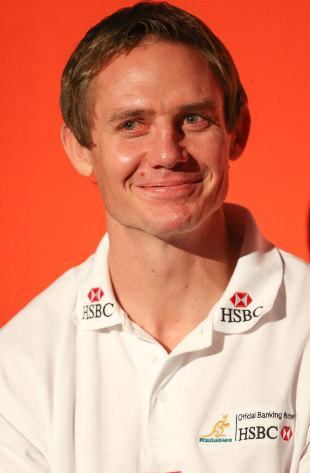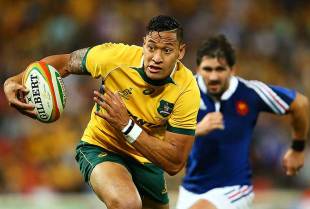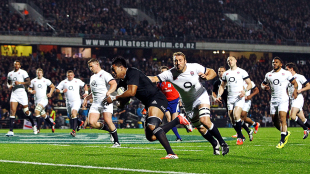|
Rugby Championship
Wallabies of 2014 echo class of 1998: Steve Larkham
Andy Withers
August 6, 2014
Steve Larkham reflects on the Bledisloe Cup, and what it meant to him as a boy, a player and an Australian
Three sayings taken as truth: those who fail to learn from history are doomed to repeat it; the darkest hour is just before the dawn; Australia will regain the Bledisloe Cup. We don't know yet if the Wallabies' dawn will break this year or next, or if they are doomed to another 12 years of ever-darker purgatory, but they will drink from the cup once again; it's a given, just as the Waratahs sometime surely had to win the Super Rugby trophy, and just as the Blues had to end Queensland Maroons' dominance in State of Origin; little tackers in New South Wales hadn't known the winning feeling before June 18, 2014, then, lo and behold, like the figurative London bus … History did not foresee Australia's 12-year Bledisloe drought - nor the long-term failings of the theoretical Blues and Waratahs powerhouses - but it does say that 2014 might be the year for the Wallabies. Cast your mind back to July and August 1998: Ricky Martin and Goo Goo Dolls dominated the singles charts; Rod Macqueen had been in charge of the Wallabies as head coach 12 months, appointed after three consecutive pumpings by the All Blacks; and his team were showing improvement one year out from the Rugby World Cup in the northern hemisphere with four consecutive wins against England and Scotland after the nadir of defeat by Argentina in Buenos Aires. New Zealand had won the Bledisloe in nine of the previous 12 seasons, and Australia had not lifted the cup in three years since "The Tackle" in Sydney. 
Stephen Larkham spoke to ESPN courtesy of HSBC, for whom he is a rugby ambassador
© HSBC (Image Supplied)
Enlarge
"Rod Macqueen was the change that Australian rugby needed," Steve Larkham told ESPN exclusively. "He certainly brought a business-like attitude to our training approach. Everything was done for a reason, and there were goals set; there were visions of where we going to end up in world rugby. There was a real belief in the team that the program we were in was going to be successful and bring results. "And the guys are feeling that now, with Ewen [McKenzie]. "They've had seven wins in a row and they're starting to get that belief back again. And it's that business approach that Ewen's brought back in to the side; they'll be feeling similar things to us in terms of that belief and that confidence to go out there and beat any opposition in the world." Australia defeated the All Blacks 24-14 in the first Bledisloe Test of the 1998 campaign before securing the silverware with a remarkable 27-23 victory at Jade Stadium in Christchurch and completing the series sweep with a 19-14 verdict at Sydney Football Stadium. To put a historical context on the victory in Christchurch, the Wallabies had lost six consecutive Tests in the southern city, and they had lost six on end in New Zealand since winning in Wellington in 1990. The home crowd, if not the entire host nation, could not believe what they had seen, that the Wallabies had stolen the Bledisloe, and the "muted sullenness" in the stands prompted then Australian Rugby Union chief executive John O'Neill to ponder memorably ''the silence of the lambs''. "Being in the sheds drinking out of the Bledisloe for the first time was a fairly special occasion," Larkham told ESPN of his memories of Christchurch, where he had scored a try in the second half. "There was a bit of an aura about the All Blacks at the time. We certainly felt there was an aura around them, that they were almost invincible and unbeatable. That was the first time we'd found a little bit of confidence against them, and we had a bit of success against them from then on." 
Australia's win in Christchurch in 1998 stunned all of New Zealand © Getty Images
Enlarge
Success? The Wallabies retained the Bledisloe Cup until 2002, since when they haven't got within coo-ee. "Five years," Larkham said. "It was easier to retain the trophy than to win it back then, but, none the less ... Waratahs inspirational for Wallabies: Luke Burgess
%]"That was the game that gave the group of players that I was playing with the confidence to play the All Blacks and not be intimidated by them." That growing confidence would see Larkham and his team-mates win the 1999 Rugby World Cup, win the 2000 and 2001 Tri Nations tournaments, and claim Australia's only series win over the British & Irish Lions. No one is saying the current Wallabies are on the cusp of a similar run of success - least of all Larkham - but there is a lot to like about the team and the way they are playing. "The beauty of the game at the moment is they've got the confidence to run the ball from anywhere," Larkham said. "They've got really dangerous players in their backline, right across the board, and they've got that confidence to run. They've got good ball players who see the space well and who get the ball to space well. "Defensively, they seem to be working for one another well; there's really good attitude to get up off the deck, to get in the front line, to make tackles, to cover for one another; there's that real desperation in their game as well. "Weaknesses? You don't see too many, and I guess that's a reason why they've won seven in a row now. They're probably not as consistent as they need to be at set-piece time, but it's not far off the mark; that's about it." 
Israel Folau and the Wallabies carved France apart in two of their three recent makes a break
© Getty Images
Enlarge
The improved form of McKenzie's Wallabies since their shellacking by New Zealand and South Africa this time last season has come primarily since the coach asserted his authority in demonstrable fashion in Dublin, where he suspended six players after a boozy night out to show his developing team culture had no room for "amateur-hour" shenanigans. "The culture that most coaches talk about now is the performance culture," Larkham, the Brumbies coach, told ESPN. "Everything you do, every decision you make on the field, off the field, is about getting the best performance on the weekend or in two weeks or in a month's time … "The approach we had with Rod Macqueen was very similar: rugby was in a transition stage going from amateur to professional, and there were a lot of traits from the amateur era that were probably holding back our performances on the field; that was tightened up off the field in terms of making sure we were thinking about what we were doing off the field, and how that would affect what we were doing on the field. That created the culture, and it's no different now … "You look at a couple of the players they got rid of the Wallabies set-up, and it probably improved the culture. And then the new guys have got an opportunity in the environment, and they've really taken to the culture and added to it, showing the hunger and their eagerness to get in there and make the most of every opportunity whereas some of the guys who had been there for a while probably had a bit of complacency in their game, both on the field and off the field. The culture instilled in the Wallabies now is so much better than it was two years ago." Larkham is hopeful that Australia can break the Bledisloe drought in the coming weeks, but he acknowledges fully that New Zealand are not the No.1 team in the world for no reason. The All Blacks, after all, are on a 17-Test tear and victory over Australia at ANZ Stadium on August 16 will see them own outright the longest winning streak in tier-one Test history. 
The All Blacks are clinical, capitalising on every tiny mistake by their opponents
© Getty Images
Enlarge
"The belief's there," Larkham said of the All Blacks. "That's the biggest thing; they're mentally strong, they've got that edge and nothing really fazes them; they expect to make mistakes, and they bounce back well from them. "They're very good at taking opportunities. You make a mistake out there and they're pretty quick to pounce. They've got a very dangerous back three, and they shift the ball well. They've got a good all-round game - a kicking-running-defensive game - and they're very adaptable. Conditions, referee decisions, opposition, they seem to find a solution to most things. But … "I'd imagine there's a fair bit of uncertainty in what's going to occur in these next couple of Test matches. Super Rugby wise, we've finally found our form in Australia."
Stephen Larkham spoke to ESPN courtesy of HSBC, for whom he is a rugby ambassador. HSBC, the world's leading international bank, is proud to partner with the Wallabies. HSBC shares the ARU's ambitions to grow and constantly strive for success www.youtube.com/hsbc.
© ESPN Sports Media Ltd
|
Live Sports
Communication error please reload the page.
-
Football
-
Cricket
-
Rugby
-
- Days
- Hrs
- Mins
- Secs
F1 - Abu Dhabi GP
Abu Dhabi Grand Prix December 11-131. Max Verstappen ()
2. Valtteri Bottas (Mercedes)
3. Lewis Hamilton (Mercedes)
4. Alexander Albon ()
5. Lando Norris ()
6. Carlos Sainz Jr ()
-
ESPNOtherLive >>
Golf - Houston Open
Snooker - China Open
Tennis - Miami Open

